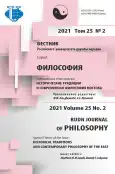Discussion on the Self in "Milindapañha" on Chariot: New Translation and Comments
- Authors: Titlin L.I.1
-
Affiliations:
- Institute of Philosophy, Russian Academy of Sciences
- Issue: Vol 25, No 2 (2021): HISTORICAL TRADITIONS AND CONTEMPORARY PHILOSOPHY OF THE EAST
- Pages: 260-275
- Section: HISTORICAL TRADITIONS AND CONTEMPORARY PHILOSOPHY OF THE EAST
- URL: https://journal-vniispk.ru/2313-2302/article/view/324996
- DOI: https://doi.org/10.22363/2313-2302-2021-25-2-260-275
- ID: 324996
Cite item
Full Text
Abstract
Introduction A good example of emergentism - interpreted by M. Siderits [1] as - Buddhist reductionism) is an excerpt from the dialogue between King Milinda[4] and the monk Nāgasena[5] about the self, which is part of the text close to the Abhidhamma tradition entitled "Milindapañha" (or "Questions of King Milinda"). The text was published by V. Trenckner in 1880 in [2] and translated into English by T.W. Rhys Davids [3] in the series "Sacred Books of the East". Furthermore, there is an English translation by I. B. Horner [4] and Bhikkhu Pesala [5] and into Russian by A.V. Paribok [6]. There are also German [7] and French translations [8; 9]. Yet the classical translation by Rhys Davids is currently largely obsolete. Paribok's translation into Russian is not convenient for practical use as it would need to be further translated into English, and this double translation, which is not very good from the point of view of the philological approach to the text. We have therefore decided to make our own, new translation of the passage from "Milindapañha", in which the dialogue about the self is being held.
Keywords
About the authors
Lev I. Titlin
Institute of Philosophy, Russian Academy of Sciences
Author for correspondence.
Email: titlus@gmail.com
CSc in Philosophy, Senior Research Fellow, Oriental Philosophies Department
12/1, Goncharnaya Str., Moscow, 109240, Russian FederationReferences
- Siderits M. Personal Identity and Buddhist Philosophy. Aldershot, England: Ashgate; 2003.
- Trenckner V, editor. The Milindapañho: Being Dialogues Between King Milinda and the Buddhist Sage Nāgasena. London: Williams and Norgate; 1880.
- Rhys Davids TW, translator. The Questions of King Milinda. Oxford: The Clarendon Press; 1890, 1894.
- Horner IB, translator. Milinda's Questions. London: Wisdom Publications; 1963-1964.
- Pesala В, translator. The Debate of King Milinda [Internet]. Penang: Inward Path; 2001 [cited 2021 Apr 27]. Available from: http://www.buddhanet.net/pdf_file/ milinda.pdf
- Paribok AV, translator. The Questions of Milinda (the Milindapañho). M.: Nauka; 1989. (In Russian).
- Nyanatiloka T, translator. Die Fragen des Milindo. Bd. 1. Leipzig; 1919. Bd. 2. Munchen-Neubiberg; 1924.
- Finot L, translator. Milinda-Pañha. Les questions de Milinda. Paris: Bossard; 1923.
- Nolot É, translator. Entretiens de Milinda et Nāgasena: Version intégrale. Paris: Gallimard; 1995.
- Potter KH, editor. Encyclopedia of Indian Philosophies. Vol. VII. Abhidharma Buddhism to 150 A.D. Delhi: Motilal Banarsidass; 2006.
- Titlin LI. The Polemics Between the Buddhists and the Vaisheshikas on the Self in “Pudgalavinishchaya” of Vasubandhu. RUDN Journal of Philosophy. 2019;23(1):46-55.
- Gopnik A. Could David Hume Have Known about Buddhism?: Charles François Dolu, the Royal College of La Flèche, and the Global Jesuit Intellectual Network. Hume Studies. 2009;35(1):5-28.
- Giles J. The no-Self Theory: Hume, Buddhism, and Personal Identity. Philosophy East and West. 1993;43(2):75-200.
- Taylor AC, editor. Kathāvatthu. In 2 Vols. London: Pali Text Society; 1984.
- Kapstein M. Reason's Traces: Identity and Interpretation in Indian and Tibetan Buddhist Thought. Boston: Wisdom Publications; 2001.
- Titlin LI. The Concept of Pugdala in the Buddhist School of Pudgalavāda: the Problem of Interpretation and the Evolution of the Conception. RUDN Journal of Philosophy. 2014;1:105-111.
- Rosenberg OO. Problems of Buddhist Philosophy. In: Rosenberg OO. Works on Buddhism. Moscow: Nauka; 1991.
- Rhys Davids TW, Stede W, editors. The Pali Text Society's Pali-English dictionary. London: Chipstead; 1921-1925.
- Kant I. Works in German and Russian. Critique of Pure Reason. Vol. 2. Part 1. Moscow: Nauka; 2006. (In Russian).
- Shastri SD, editor. Abhidharmakosa & Bhasya of Acharya Vasubandhu with Sphutartha Commentary of Acharya Yasomitra. Part II. Varanasi: Bauddha Bharati; 1970.
- Titlin LI. Vasubandhu. Abhidharmakośa, Book 9 “Pudgalaviniścaya” With the Commentary “Spuṭārtha” of Yaśomitra. Translation from Sanskrit, Introduction, Investigation and Comments by Lev Titlin. Moscow: Buddadharma; 2021. (In Russian).
Supplementary files









